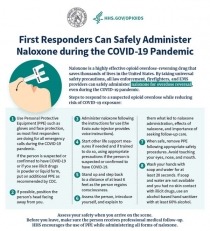As the opioid crisis continues to ravage communities across the United States, treatment options for those with opioid addiction have become increasingly important. One of the most promising treatments is the use of naloxone, an opioid antagonist that can reverse the effects of an opioid overdose. But while naloxone has proven effective in treating opioid overdoses, one of the most common questions is whether or not naloxone is itself addictive. In this article, we’ll explore the potential risks and benefits of using naloxone and answer the question: is naloxone addictive?

Is Naloxone Addictive?
Naloxone is a medication that is used to treat opioid overdoses. It is also known by its brand name, Narcan. Naloxone works by blocking the effects of opioids such as heroin and prescription painkillers. It is an important tool in helping to reduce opioid overdose deaths. However, some people are concerned that it can be addictive. To understand if this is true, it is important to look at the facts.
What is Naloxone?
Naloxone is an opioid antagonist, meaning that it binds to opioid receptors in the brain and blocks them from receiving signals from opioid drugs. This can help to reverse the effects of an opioid overdose. Naloxone is available as a nasal spray, an injection, or an auto-injector. It is often carried by first responders, such as police officers, firefighters, and paramedics, in order to treat opioid overdoses quickly.
Is Naloxone Addictive?
The short answer is no, naloxone is not addictive. It is not an opioid drug and does not produce any of the pleasurable effects that opioids do. It does not cause any sort of physical or psychological dependence. In fact, naloxone is used to treat opioid addiction and is often prescribed to people who have stopped using opioids but still have cravings.
Side Effects of Naloxone
Naloxone can cause some side effects, although these are usually mild and short-lived. These include nausea, vomiting, headache, dizziness, sweating, and flushing. In rare cases, naloxone can cause an allergic reaction, which may include difficulty breathing, hives, swelling, or rash. It is important to seek medical attention immediately if any of these symptoms occur.
Who Should Take Naloxone?
Naloxone is a safe and effective medication that can be used to treat opioid overdoses. It is especially important for people who are at risk of experiencing an opioid overdose, such as those who are taking high doses of opioids or who have opioid use disorder. It is also important for family members, friends, and first responders to have access to naloxone in case of an overdose.
Conclusion
Naloxone is a medication that is used to treat opioid overdoses. It is not an opioid drug and does not cause any sort of physical or psychological dependence. It is safe and effective and can be used to treat opioid overdoses. It is especially important for people who are at risk of experiencing an opioid overdose to have access to naloxone in case of an emergency.
Few Frequently Asked Questions
What is Naloxone?
Naloxone is a medication used to reverse opioid overdose. It is an opioid antagonist, meaning it binds to opioid receptors and can reverse and block the effects of other opioids. It can rapidly restore normal respiration to a person whose breathing has slowed or stopped due to overdosing on heroin or prescription opioid pain medications. It is the active ingredient in the drug Narcan, and is available in generic forms as well.
Is Naloxone Addictive?
No, naloxone is not addictive. It is an opioid antagonist and does not produce any of the pleasurable effects associated with opioid use. It also does not cause any physical dependence or tolerance. Naloxone is only used to reverse the effects of opioid overdose and is not intended for recreational use.
What are the Side Effects of Naloxone?
Common side effects of naloxone include nausea, vomiting, shakiness, sweating, confusion, and fast heart rate. In rare cases, it can also cause an allergic reaction. If you experience any of these side effects, you should seek medical attention.
What is the Dosage of Naloxone?
The recommended dosage of naloxone for reversing an opioid overdose is 2 to 4 mg injected intramuscularly or intravenously. The dose may be repeated if the initial dose does not work. It is important to note that naloxone should only be used in cases of opioid overdose and not as a substitute for opioid pain medications.
How Long Does Naloxone Last?
The effects of naloxone usually last up to 1-2 hours. If a person has taken a significant amount of opioids, the effects of naloxone may not last as long and the person may need additional doses of naloxone. It is important to seek medical attention for any opioid overdose, even if the person has been administered naloxone.
Who Should Carry Naloxone?
Naloxone should be readily available to anyone who is at risk of an opioid overdose, including those who take opioid pain medications and those who use illicit opioids. It should also be available to family members, friends, and other individuals who may be in a position to help someone experiencing an opioid overdose.
Addiction: Naloxone PROs and CONs
In conclusion, it is clear that Naloxone is not an addictive drug. Despite the fact that it is derived from opioids, it does not produce the same sensation of euphoria that makes the drugs so addictive. It is an effective tool in the fight against opioid addiction and overdoses, and should be used in cases where opioids are present. Naloxone is a valuable tool in combatting opioid addiction and should be readily available in all medical, emergency, and public settings.

